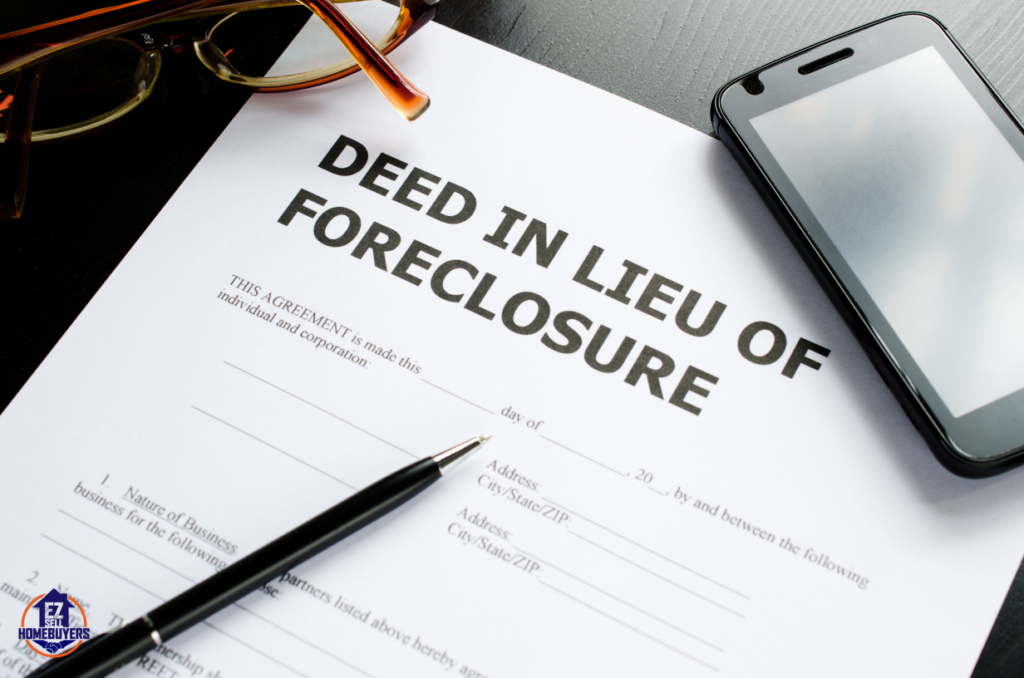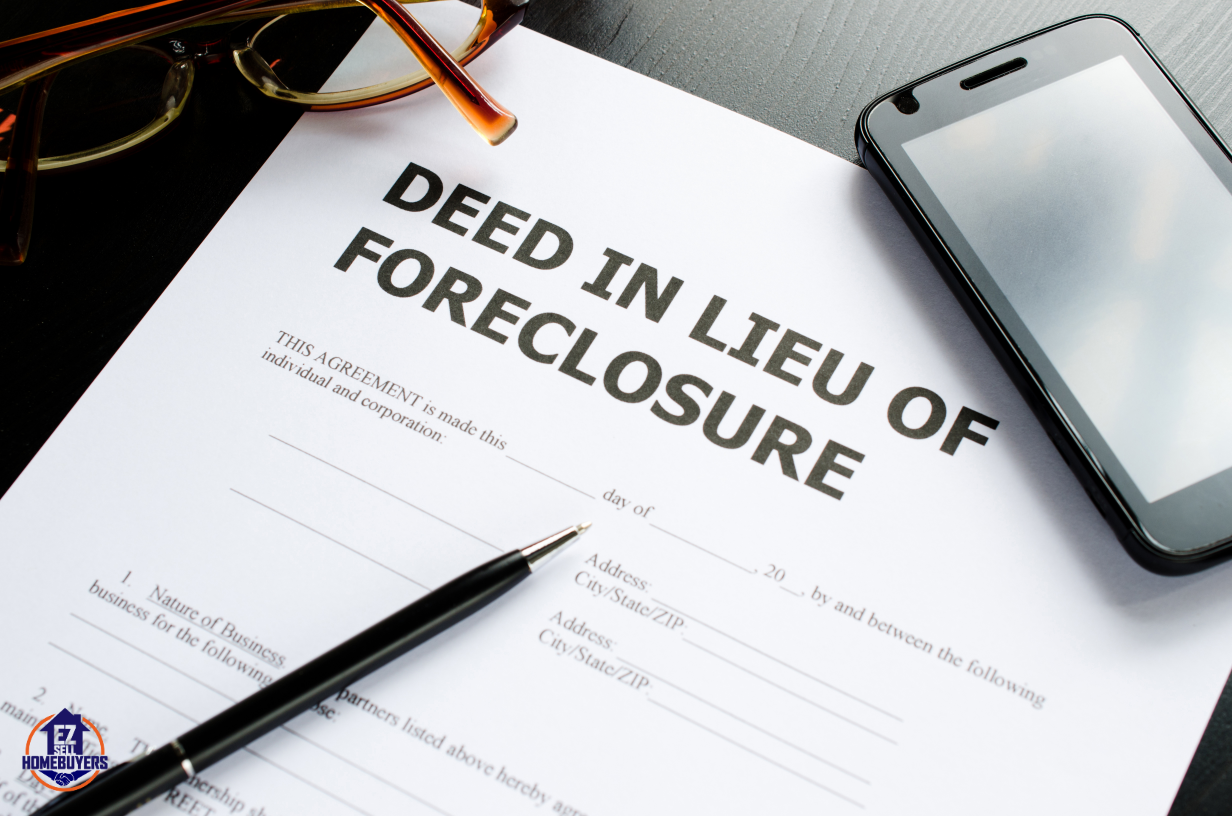Facing foreclosure is a challenging experience, especially for homeowners in Ohio struggling to keep up with their mortgage payments. One alternative that may help you avoid the lengthy and stressful foreclosure process is a deed in lieu of foreclosure. This option allows you to voluntarily transfer ownership of your property to the lender in exchange for being released from your mortgage obligations. But how does a deed in lieu of foreclosure work in Ohio, and is it the right choice for you? Drawing on my 23 years of experience as a real estate investor and advisor in Ohio, this article will explore the deed in lieu process in Ohio, its benefits, eligibility requirements, and how it compares to foreclosure. We will also discuss other viable options, such as selling your house to a cash investor.

What is a Deed In Lieu of Foreclosure?
As I’ve experienced multiple times assisting Ohio homeowners, a deed in lieu of foreclosure is essentially a voluntary agreement where you transfer your property deed back to the lender in exchange for being released from your mortgage obligations. This process, recognized under Ohio law and often cited by legal experts, can help you avoid the negative effects of foreclosure on your credit report. This option is often a preferred alternative for Ohio homeowners looking for a swift resolution to their mortgage troubles. For a deeper dive into Ohio-specific legalities, you might consult the Ohio Revised Code on foreclosure proceedings here.
How Does the Deed In Lieu of Foreclosure Process Work in Ohio?
Understanding the deed in lieu process in Ohio is crucial, especially from someone who’s been directly involved in these negotiations with lenders. Here’s a step-by-step breakdown of what you can expect, highlighting insights and common pitfalls from my first-hand encounters with this process:
- Contact Your Lender: The first step in pursuing a deed in lieu of foreclosure is to contact your mortgage lender. It’s crucial to express your interest in exploring this option and understand the lender’s requirements.
- Eligibility Review: Not all homeowners will qualify for a deed in lieu, and this determination can vary based on the lender. From my experience working closely with Ohio lenders, they often review factors such as whether the homeowner has made reasonable efforts to sell the property, the home’s market value compared to the outstanding mortgage, and the overall financial hardship situation. For further details, you can reference the U.S. Department of Housing and Urban Development’s guidelines on foreclosure alternatives.
- Property Valuation: Your lender may require a property appraisal or valuation to determine the current market value of your home. This step helps the lender assess whether accepting the deed in lieu is financially viable compared to proceeding with foreclosure.
- Negotiating Terms: If the lender agrees to consider a deed in lieu, the next step involves negotiating the terms. It’s crucial to ensure that the agreement fully releases you from any remaining mortgage debt and does not include any hidden fees or obligations. Legal representation is recommended during this step to ensure your rights are protected.
- Signing the Deed: Once both parties agree to the terms, you will sign the deed transferring ownership of the property to the lender. For homeowners in Ohio, this step usually involves navigating state-specific legal requirements.
- Finalizing the Process: After signing, the lender will take possession of the property, and your mortgage debt will be discharged. You may be required to vacate the property within a specified timeframe.
Eligibility Requirements for a Deed In Lieu in Ohio
Not all Ohio homeowners qualify for a deed in lieu of foreclosure. Based on my extensive experience, here are some common eligibility requirements:
- Financial Hardship: You must demonstrate a genuine financial hardship that makes it impossible to continue paying your mortgage.
- Attempts to Sell: Many lenders require homeowners to make a reasonable effort to sell the property before considering a deed in lieu.
- Clear Title: The property title must be clear of any other liens or judgments, as additional encumbrances can complicate the transfer process.
- Primary Residence: The home should typically be your primary residence, although some exceptions may apply.
Benefits of a Deed In Lieu of Foreclosure in Ohio
Choosing a deed in lieu of foreclosure offers several benefits compared to the traditional foreclosure process. From my extensive work assisting Ohio homeowners, this option can offer the following:
- Avoiding Foreclosure: A deed in lieu allows you to avoid the lengthy and public foreclosure process, which can be emotionally and financially draining.
- Reduced Impact on Credit: While your credit score will still be affected, the impact is generally less severe than that of a foreclosure. Financial experts, including credit analysts, note that a deed in lieu is typically reported as a settlement on your credit report, which can make it less damaging in the long term. For more on how this impacts your credit, you can check guidelines from credit reporting agencies like Experian here.
- Potential Relocation Assistance: Some lenders offer relocation assistance to help you cover moving costs, making the transition smoother.
- Release from Debt: In many cases, the lender will agree to release you from any remaining mortgage balance, allowing you to move forward without lingering debt.
Deed In Lieu vs. Foreclosure in Ohio
When deciding between a deed in lieu and foreclosure, it’s essential to weigh the pros and cons of each option. From my first-hand knowledge and direct involvement with these processes in Ohio, here’s a quick comparison:
- Impact on Credit: A foreclosure can remain on your credit report for up to seven years, significantly damaging your credit score. A deed in lieu, while still harmful, generally results in a less severe impact on your credit.
- Timeline: The foreclosure process in Ohio can take several months or even years, prolonging the stress and uncertainty. A deed in lieu can be completed much faster, allowing you to move on more quickly.
- Deficiency Judgment: Ohio law permits lenders to seek a deficiency judgment after foreclosure, which means you could still owe money if the sale of the home doesn’t cover the outstanding mortgage. With a deed in lieu, you can often negotiate a full release from the remaining debt. The Ohio Legal Aid Society further outlines these benefits, which you can explore in detail here.
Alternative Solution: Selling to a Cash Investor
If you find that a deed in lieu does not meet your needs, consider selling your home to a cash investor as an alternative. Cash investors can offer quick closings, no need for repairs, and often cover all transaction costs, which can help homeowners avoid foreclosure and walk away with some cash. As a real estate investor who has bought numerous homes from distressed sellers in Ohio, I can attest to how this option provides a quick, hassle-free exit strategy for many homeowners facing financial difficulties.
Final Thoughts
A deed in lieu of foreclosure in Ohio can be a viable solution for homeowners facing financial hardship and unable to keep up with mortgage payments. By transferring the property back to the lender, you can avoid the damaging effects of foreclosure and potentially secure a fresh financial start. However, it’s essential to thoroughly understand the eligibility requirements, process, and potential impacts on your credit before proceeding. Consulting with a real estate attorney or financial advisor can help you make the best decision for your specific situation.
If you’re considering a deed in lieu of foreclosure in Ohio, take the first step today by contacting your lender and exploring your options. Understanding how this process works could help you avoid foreclosure and move forward with greater peace of mind.
Frequently Asked Questions (FAQ)
1. What is a deed in lieu of foreclosure?
A deed in lieu of foreclosure is an agreement where a homeowner voluntarily transfers their property deed to the lender in exchange for being released from their mortgage obligations. This process allows homeowners to avoid the traditional foreclosure process and its negative impact on credit.
2. How does the deed in lieu of foreclosure process work in Ohio?
The process involves contacting your lender, reviewing eligibility, assessing property value, negotiating terms, signing the deed, and finalizing the transfer of property. Each step involves careful consideration to ensure the homeowner’s rights are protected.
3. Who qualifies for a deed in lieu of foreclosure in Ohio?
Eligibility often depends on demonstrating financial hardship, having a clear title, making reasonable attempts to sell the property, and ensuring the home is your primary residence. Not all homeowners will qualify, and it’s essential to consult your lender for specific requirements.
4. What are the benefits of a deed in lieu of foreclosure?
The benefits include avoiding the public and lengthy foreclosure process, reduced impact on credit compared to a foreclosure, potential relocation assistance, and a full release from remaining mortgage debt.
5. How does a deed in lieu of foreclosure affect my credit?
A deed in lieu of foreclosure is typically reported as a settlement rather than a foreclosure, which can lessen the damage to your credit score. However, your credit will still be negatively affected, but usually less so than with a full foreclosure.
6. What is the difference between a deed in lieu of foreclosure and foreclosure?
A foreclosure is a legal process where the lender takes possession of the property due to missed mortgage payments, often leading to a significant credit score drop. A deed in lieu is a voluntary agreement to transfer ownership back to the lender, typically resulting in a faster resolution and less severe credit impact.
7. Can I sell my house to a cash investor instead of doing a deed in lieu of foreclosure?
Yes, selling to a cash investor is an excellent alternative. Cash investors often buy homes quickly, require no repairs, and cover transaction costs, allowing you to avoid foreclosure and move on with cash in hand.
8. Are there any downsides to a deed in lieu of foreclosure?
While a deed in lieu can be beneficial, it may still affect your credit, and there could be tax implications. Additionally, the property must typically have no other liens, and lenders are not obligated to accept a deed in lieu offer.
9. Should I consult a professional before proceeding with a deed in lieu of foreclosure?
Yes, it’s highly recommended to consult with a real estate attorney, financial advisor, or foreclosure specialist to ensure you fully understand your options and make the best decision for your situation.
10. Where can I find more information on foreclosure alternatives in Ohio?
For detailed guidelines on foreclosure alternatives, including deeds in lieu of foreclosure, refer to resources such as the U.S. Department of Housing and Urban Development, the Ohio Legal Aid Society, and the Ohio Revised Code.

